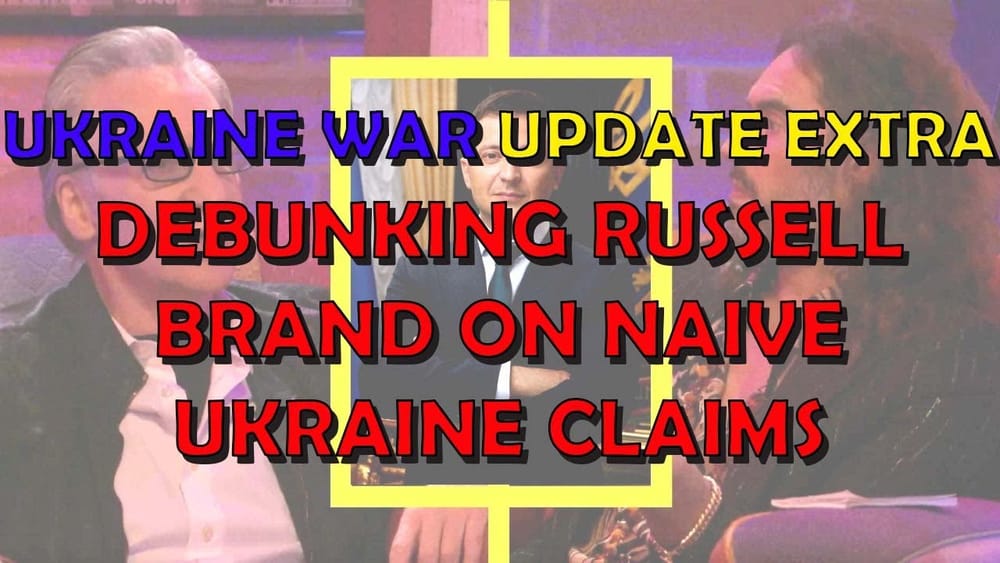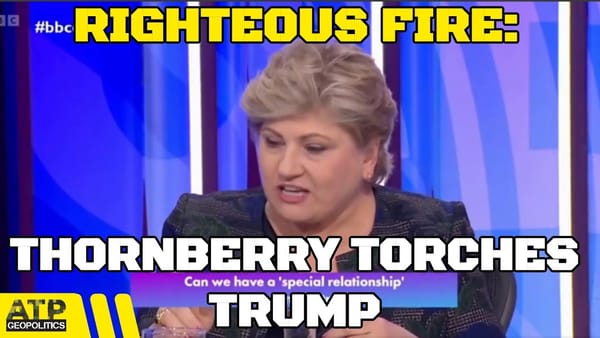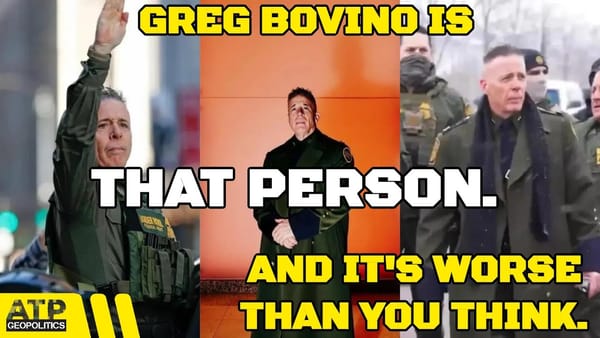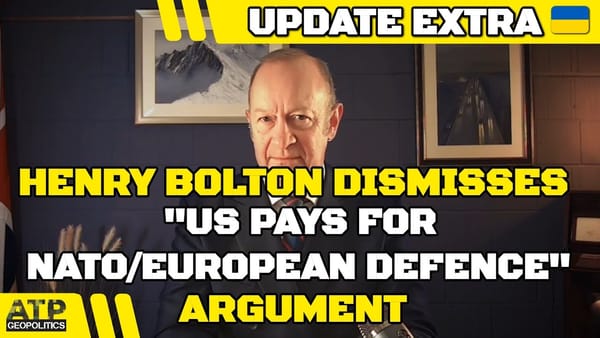Ukraine War Upd. EXTRA: Debunking Russell Brand's Naive Ukraine Claims
Table of Contents 📖
"The tragedy, the whole, the biggest tragedy of this whole Ukraine situation is the fact that it's not in NATO. That's the only thing that could have protected it. So this idea that, 'Oh, we shouldn't allow countries to join this defensive alliance,' it's complete, it's complete nonsense."
Hello Team
🎦 00:00-03:57⏩
Jonathan introduces his guest, Tom, who previously joined him to debunk Candace Owens' claims about the Ukraine war. Today, they will be analyzing a short video by Russell Brand, a UK comedian with a large following, known for his recent shift towards controversial populist viewpoints. Tom selected this video due to Brand's unsubstantiated claims, which echo Russian propaganda talking points.
Return to top⤴️
NATO Encroachment
🎦 03:57-09:23⏩
Jonathan and Tom analyze Brand's claim of NATO encroachment, emphasizing that Eastern European countries voluntarily sought NATO membership after the fall of the Soviet Union due to fear of Russian aggression. Jonathan argues that NATO's involvement in these countries is a response to Russia's actions. He expresses his belief that allowing Ukraine to join NATO would have prevented the current war and protected Estonia, Latvia, and Lithuania from potential invasion.
Return to top⤴️
Minsk Agreement
🎦 09:23-11:11⏩
, 11:11-17:53⏩
, 57:41-01:02⏩
:07
Jonathan and Tom discuss Brand's claim that Zelensky abandoned the Minsk Agreement, highlighting the Russian propaganda narrative surrounding Zelensky's comments to the German newspaper _Der Spiegel_. They delve into the history of the Minsk Agreements, noting the various versions, Russia's repeated violations, and Putin's attempts to exploit the ceasefire for territorial gains. They emphasize that the agreements aimed to grant special status to the Donetsk and Luhansk regions, which would have allowed Russia to undermine Ukrainian democracy. Jonathan and Tom conclude that the Minsk Agreements were ultimately a vehicle for Russian control and unworkable from Ukraine's perspective. They argue that the agreements were abandoned when Putin invaded Ukraine in 2022.
Return to top⤴️
Zelensky's Offshore Companies
🎦 17:53-24:46⏩
Jonathan addresses Brand's insinuation of corruption in Ukraine, citing the Pandora Papers, which revealed Zelensky's ownership of offshore companies prior to becoming president. Jonathan clarifies that offshore holdings are not unusual among wealthy individuals and politicians, citing UK comedian Jimmy Carr as an example. He argues that Zelensky's actions were not illegal and emphasizes Ukraine's significant progress in combating corruption since Yanukovych's presidency, contrasting it with Russia's continued decline in Transparency International's Corruption Perceptions Index.
Return to top⤴️
Military-Industrial Complex and American Interests
🎦 24:46-36:55⏩
, 52:04-57:08⏩
Jonathan and Tom address Brand's assertion that the US military-industrial complex is profiting from the war. Jonathan acknowledges concerns about the industry's influence but argues that they are not driving wars. He cites analysis suggesting that defense contractors profit more from peacetime contracts for large projects like the F-35 fighter jet than from wartime necessities like artillery shells. Tom points out the contradictory nature of Russian propaganda, which simultaneously claims the war benefits American interests and questions the US involvement in Ukraine. They discuss the strategic interests of the US in supporting Ukraine, including economic trade and geopolitical stability, aligning with the moral imperative to assist Ukraine.
Return to top⤴️
American Hegemony and Russian Imperialism
🎦 36:55-52:04⏩
Jonathan and Tom analyze Brand's claims about American hegemony and the desire to destabilize Russia. They argue that the US and its allies hoped for Russia to become a democratic nation after the fall of the Soviet Union, citing Merkel and the EU's efforts to foster cooperation. Jonathan emphasizes that Russia's imperialistic ambitions, evident in Putin's actions in Moldova, Georgia, and Ukraine, as well as cyberattacks against Western nations, have hindered this relationship. Tom highlights that while some cooperation existed, Russia's history of interference in Ukrainian elections, the deployment of "little green men" in the Donbas, and Putin's stated aim to reform the USSR demonstrate Russia's responsibility for the current conflict.
Return to top⤴️
Crimea as a Red Line
🎦 46:01-52:04⏩
Jonathan disputes Brand's claim that Zelensky's vow to retake Crimea would trigger nuclear war, noting that while Russian officials and state TV frequently make nuclear threats, this is primarily saber-rattling. He argues that Russia is unlikely to risk nuclear annihilation for Crimea and emphasizes the danger of appeasement, as it encourages future aggression and nuclear proliferation.
Return to top⤴️
Possibilita Ergo Probabilita Fantasy
🎦 55:00-57:08⏩
Jonathan expresses appreciation for Bill Maher's observation that the possibility of defense contractors profiting from the war does not make it the most likely reason for the conflict. He connects this to the logical fallacy known as the "possibilita ergo probabilita fantasy," where the mere possibility of something occurring is mistaken for its probability or actuality, often encountered in philosophy of religion.
Return to top⤴️
Wrap up
🎦 01:02:07-01:02⏩
:34⏩
Jonathan thanks Tom for his contributions and expresses concern about the spread of misinformation from prominent figures like Russell Brand. He emphasizes the importance of critical thinking and the need to challenge such narratives. Jonathan thanks his viewers for their support and signs off.
Return to top⤴️




